Summer 2021
June 24th — 4pm (CEST, Vienna) — Reem Talhouk (Northumbria University, UK)
Decolonising Design within Colonised Worlds
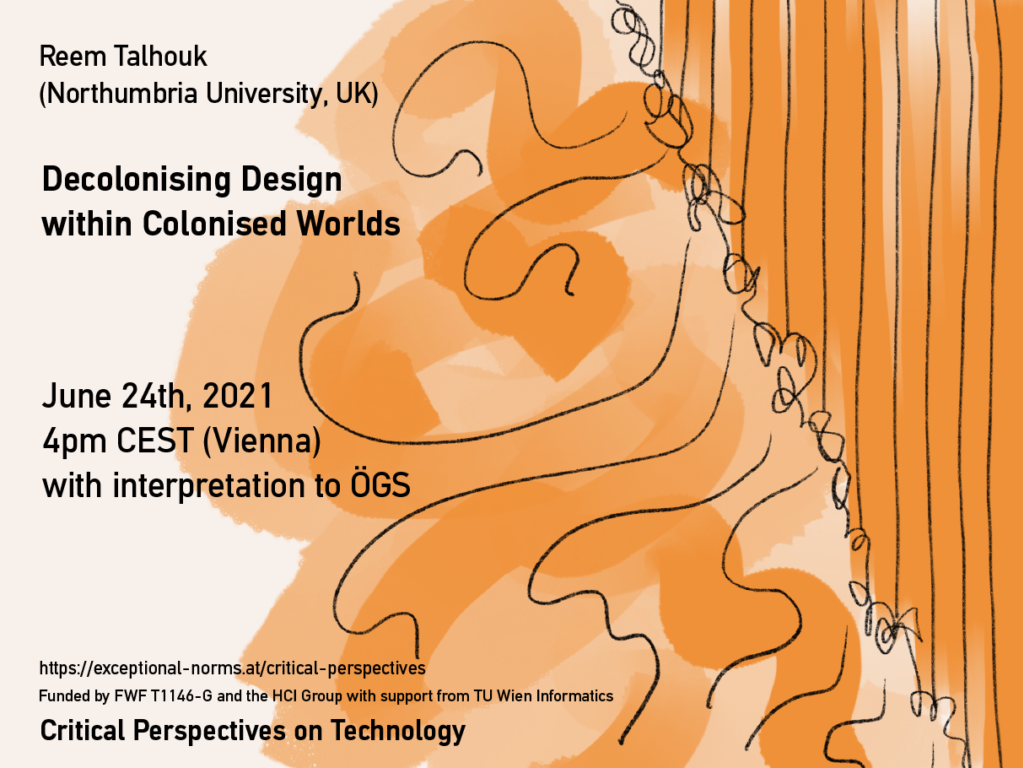
THIS TALK COMES WITH LIVE AUSTRIAN SIGN LANGUAGE INTERPRETATION (ÖGS).
Abstract
Nowadays in every academic circle I am in the topic of Decolonising Design, Technologies and Human-Computer Interaction is bound to come up. But what does it mean to do decolonial work in persistent colonised spaces? What does it mean to be a decolonised being, technology and practice? Drawing from my own research, experiences and decolonial thinkers I hope that during this talk we can reflect together on how we decolonise our ways of being and research within humanitarian, universities and community spaces. The talk is in no means a step-by-step guide, nor is it coming from a position of expertise. Rather it constitutes experiences of struggle, pain and aspiration within the spaces in which my research and myself exist that I hope we can hold together in sadness, creativity and activism.
Bio
Reem Talhouk (she/her) is a Lebanese Post-Doctoral Research Fellow in the School of Design and the Centre of International Development at Northumbria University. She is also the co-director, along with Dr Angelika Strohmayer, of the Design Feminisms research group and an affiliate of the Center for Population and Health at the American University of Beirut. She has conducted research in humanitarian contexts in the Middle East, Europe and Australia designing technologies for ‘resilience’ with refugees and asylum seekers. More recently, she has begun an exploration at the intersection of Design, Decoloniality, Global (Social) Justice and Humanitarianism in an effort to shift narratives of innovation and the ways in which refugees and minoritised people are configured within them.
June 10th — 4pm (CEST, Vienna) — Laura Forlano (Illinois Institute of Technology, USA)
Design’s Intimacies
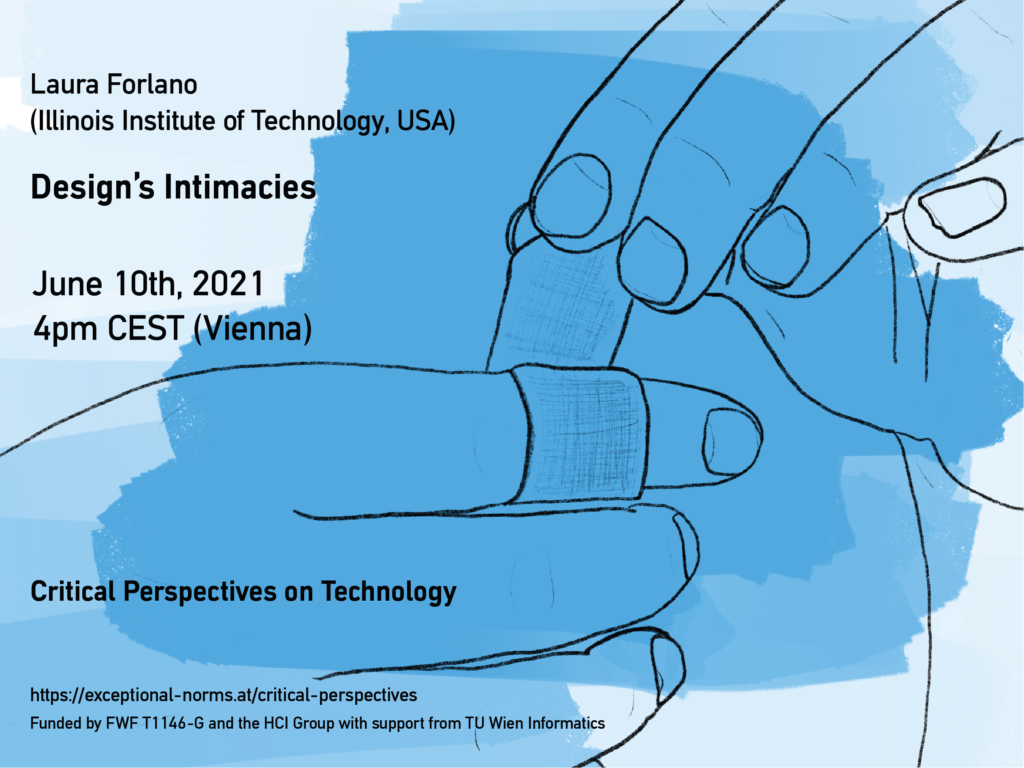
THIS TALK COMES WITH LIVE AUSTRIAN SIGN LANGUAGE INTERPRETATION.
Abstract
How do we imagine, design, use and maintain digital technologies in ways that allow all lives – human and non-human — to flourish? The answer to this question requires new understandings of what it means to be human, new conceptualizations of knowledge and expertise, new inventive methodologies as well as new ethical and political concepts. Drawing on an autoethnographic account of living with “smart” medical systems that draws on Haraway’s situated and partial knowledge, I develop the concept of the disabled cyborg, which suggests a different set contingencies and processes. Finally, I will illustrate the ways in which a first-person perspective might open up new questions and practices for design futures. How might we create a more generous understanding of human-machine relations?
Bio
Laura Forlano, a Fulbright award-winning and National Science Foundation funded scholar, is a writer, social scientist and design researcher. She is an Associate Professor of Design at the Institute of Design where she is Director of the Critical Futures Lab. Forlano’s research is focused on the aesthetics and politics at the intersection between design and emerging technologies. She is an editor of three books: Bauhaus Futures (MIT Press 2019), digitalSTS (Princeton University Press 2019) and From Social Butterfly to Engaged Citizen (MIT Press 2011). She received her Ph.D. in communications from Columbia University.
May 20th — 4pm (CEST, Vienna) — Britta Schulte (Bauhaus-Universität Weimar, DE)
#agesextech: Speculative Design for Intimate Encounters & Ageing
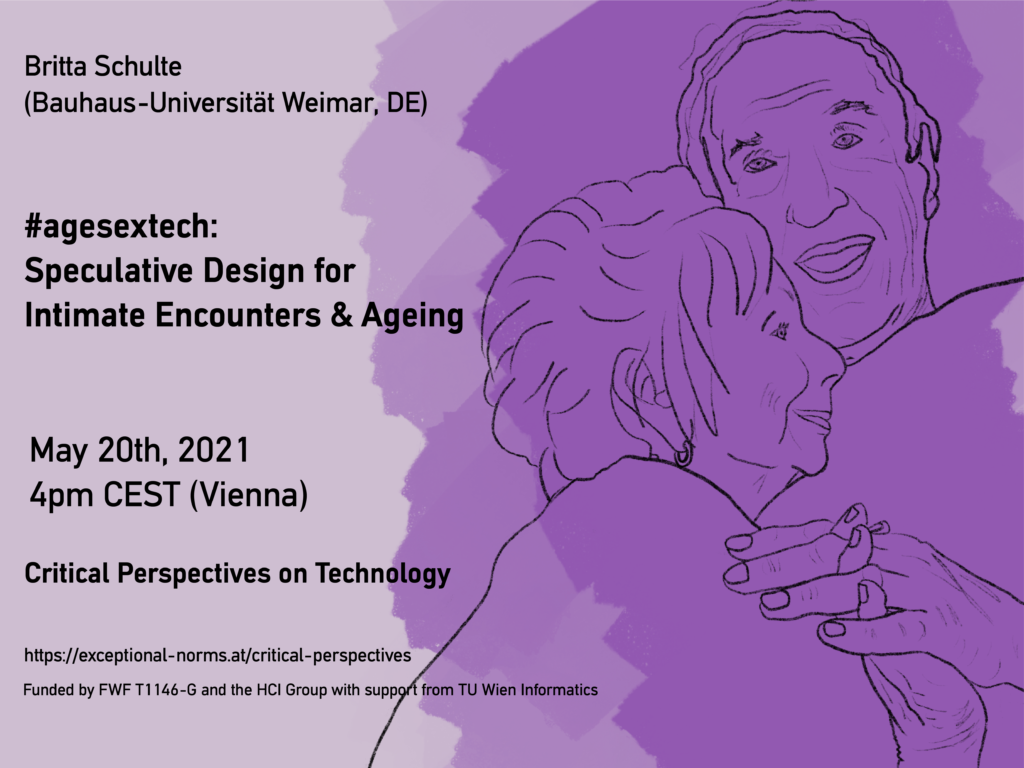
Abstract
How would you feel about a camera in your bedroom? Are microphones a better solution? While many are taken aback by these suggestions at first glance, these are sometimes suggested as means of monitoring elderly people to support their health and independent living. Through speculative design I explore in my practice why a medicalised approach to elderly care that focuses on minimising risk is problematic and how alternative designs could inspire us to rethink how we understand care, intimacy and ageing. In my talk I present examples of my work and pose the questions that have been derived through this work for future discussion and inspiration.
Bio
Britta F. Schulte is a Post-Doctoral Researcher at Bauhaus-University Weimar in Germany, after finishing off their PhD on design fictions and their use in sensitive settings such as dementia care. In their spare time, they write stories, many of which feature robots. If they are not reading, writing or knitting, they make zines, such as their self-published “Take Care #1: Robots”, “Take Care #2: Technology, Dementia & Care”, and “Don’t Blush: Sexuality, Ageing & Design”.
May 6th, 2021 — 4pm (CEST, Vienna) – The Cyborg Jillian Weise (USA) & Ashley Shew (Virginia Tech, USA)
Cyborgs in Dialogue: The Cyborg Jillian Weise (Cy) & Ashley Shew (she/her)
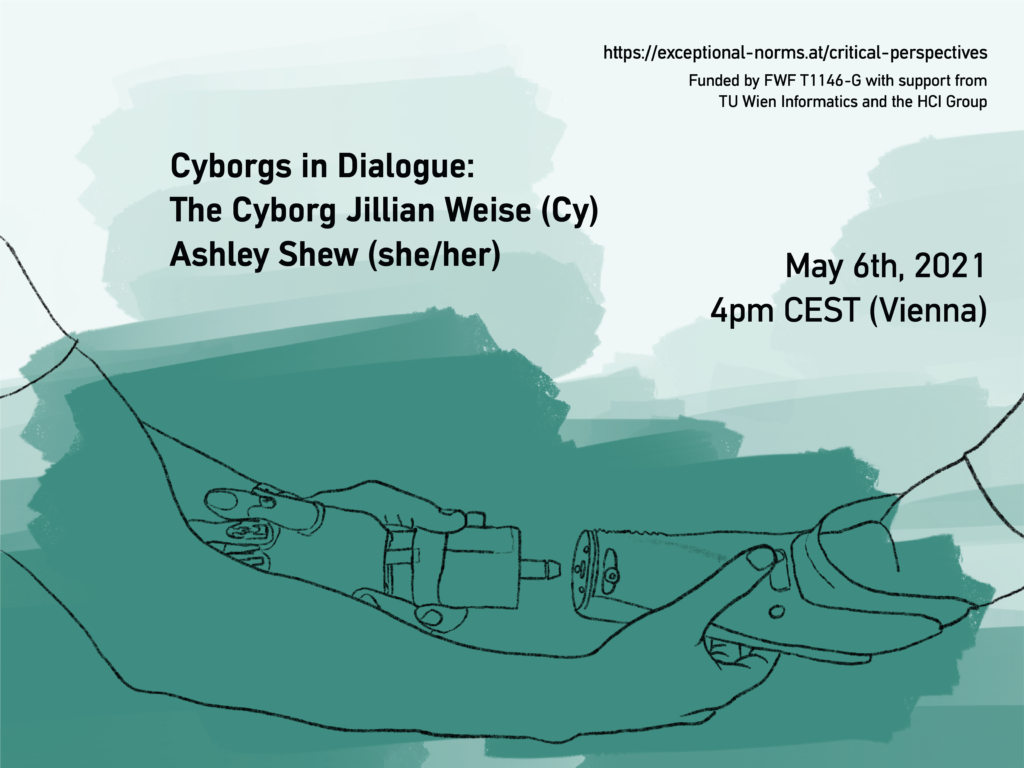
Abstract
Two cyborgs talk about being cyborgs – discussing their experiences of maintenance, wear, frustration, funding, adjustment, alternatives, etc. We correct presumptions that many people have about what it is to be prosthetized. What is a cyborg (as opposed to a tryborg)? When is it worth becoming a cyborg? At what point do we give up on a technology? Why don’t we hear more stories from technologized disabled people as common cyborgs?
Bios
Ashley Shew is an Associate Professor of Science, Technology, and Society at Virginia Tech. Shew works on philosophy of technology at its intersection with disability studies, animal studies, and emerging technologies. She serves as co-editor-in-chief of Techné, the journal of the Society for Philosophy and Technology. She is co-editor of three phil-tech volumes and sole author of Animal Constructions and Technological Knowledge (2017). Her current research is about technoableism and stories disabled people tell about technology that challenge tropey norms.
The Cyborg Jillian Weise (Cy/She/Hers) is a poet, video artist and disability rights activist. Cy’s books include The Amputee’s Guide to Sex (2007), the novel The Colony (2010), The Book of Goodbyes (2013) and Cyborg Detective (2019). Her work has appeared in The New York Times and Granta. Cy’s next book is a memoir, Common Cyborg, out from Houghton Mifflin Harcourt.
April 15th, 2021 – 4pm (CEST, Vienna) – Gopinaath Kannabiran (ITU Copenhagen, Denmark)
More Than Teledildonics and Porn: Looking back at a decade of sexuality research in HCI
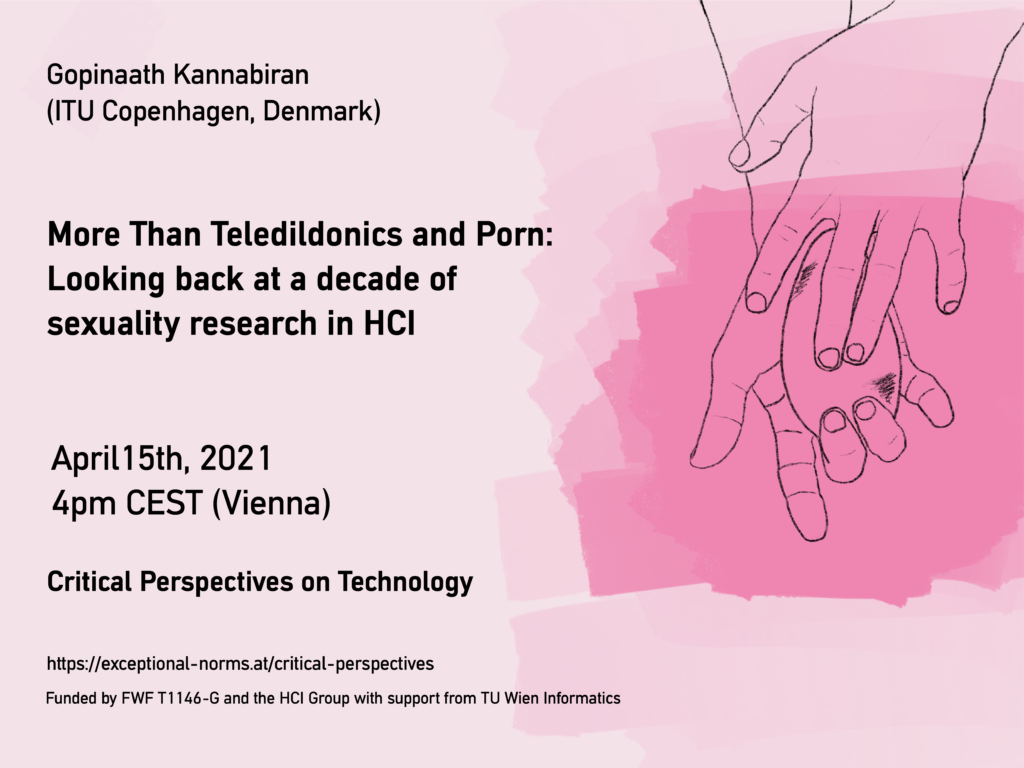
Abstract
When I introduce myself as a human sexuality researcher in the field of Human Computer Interaction (HCI), I often get asked ‘Is your research on teledildonics or porn?’ The increasing rise in high-tech designer sex toys and staggering billions of revenue generated by porn industry are good reasons for explaining why teledildonics and porn have taken center stage in public perception of sex and technology. In 2011, my co-authors and I published a research paper analyzing 70 existing works on how HCI talks about sexuality exploring discursive strategies, blind spots, and opportunities for future research. In this talk, I will present a retrospective personal reflection on how sexuality related work has progressed in HCI based on research published in the past decade (2011-2021). I will highlight major themes, draw attention to recent advancements, and discuss some of the current challenges faced by HCI researchers interested in studying design for sexual wellbeing (D4SW)· I will draw upon my personal experiences as a queer person of color, sexual rights activist, sexuality educator, and feminist researcher in HCI with the goal of dialoging with the audience by inviting questions and opinions.
Bio
Gopinaath Kannabiran is a design educator, HCI researcher, and sexual rights activist currently working as a postdoc at Computer Science Department, IT University of Copenhagen, Denmark. Details about his work can be found at: https://gopikann.wordpress.com/
with Ekaterina Osipova and Azadeh BadieiJaryani (University of Vienna) as conversation partners
March 25th, 2021 – 4pm (CET, Vienna) – Christina Harrington (DePaul University, USA)
The Future is Collectivism: Exploring Technology Co-Design from a Lens of Critical Design
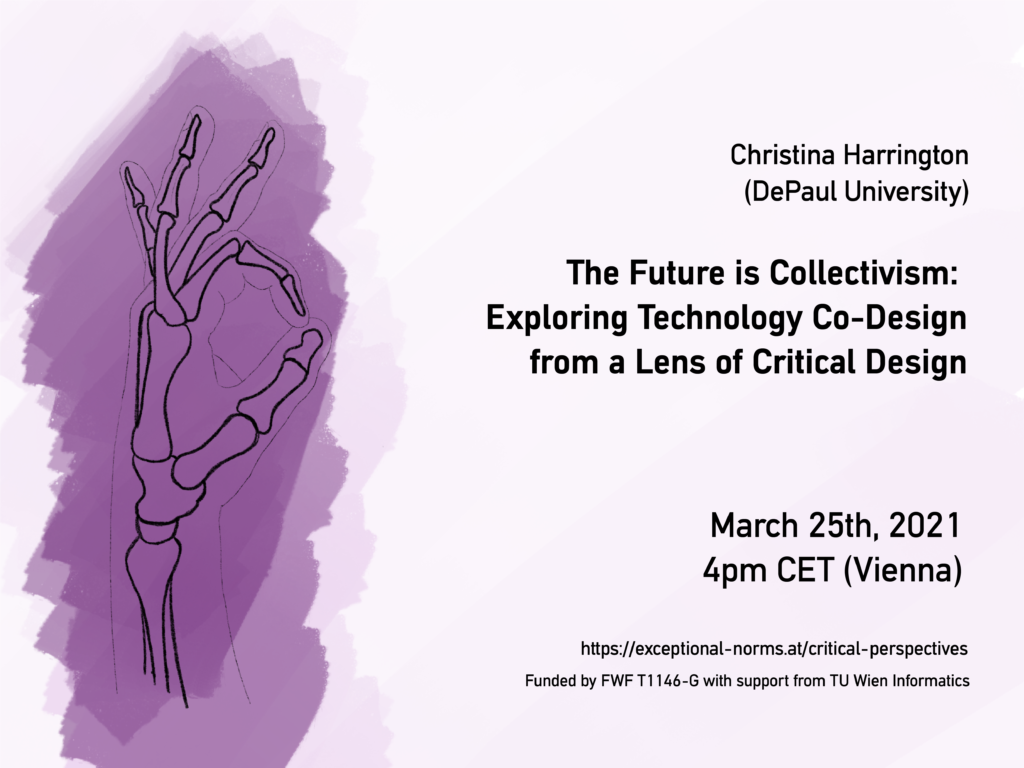
Abstract
The question of who gets to contribute to design futures and technology innovation is an important topic across design and computing fields. This conversation has grave implications for communities that often find themselves an afterthought in technology design, and who coincidentally could benefit most from technological interventions in response to societal oppression. As human-computer interaction continues to frame the intersection of people and technology through a lens of access and humanity, it’s important to consider methods and approaches to computing that are inclusive and equitable, and consider culture and identity as components of interactions. Community-based participatory design allows us to engage those at the margins in design and also considers collectivism as a meaningful approach to speculating community and technology futures. I explore concepts of community collectivism as a way to address challenges of health and racial equity, employing critical theory and frameworks that may better engage marginalized groups. From this talk I hope to build upon the conversation of Who Gets to Future?, and explore recommendations for more equitable technology futures.
Bio
As a designer and qualitative researcher, Dr. Christina Harrington focuses on understanding and conceptualizing technology experiences that support health and racial equity among marginalized groups. Her research as the Director of the Equity and Health Innovations Design Research Lab explores ways to employ design as a catalyst for health equity and socially responsible technology experiences. She explores concepts such as health, social acceptance, and collectivism through community-based participatory design and co-creation, engaging critical design and sociotechnical computing. Through participatory research methods she explores constructs of empowerment and access in design among vulnerable communities that have been marginalized along multiple dimensions of identity (age, race, ethnicity, income, class). Dr. Harrington is an Assistant Professor in the College of Computing and Digital Media at DePaul University and received her PhD from Georgia Tech’s College of Design.
with Nana Kesewaa Dankwa (University of Kassel) as conversation partner.
March 4th, 2021 – 4pm (CET, Vienna) – Sabine Harrer (Uppsala University, Sweden)
Performing Whiteness through Play
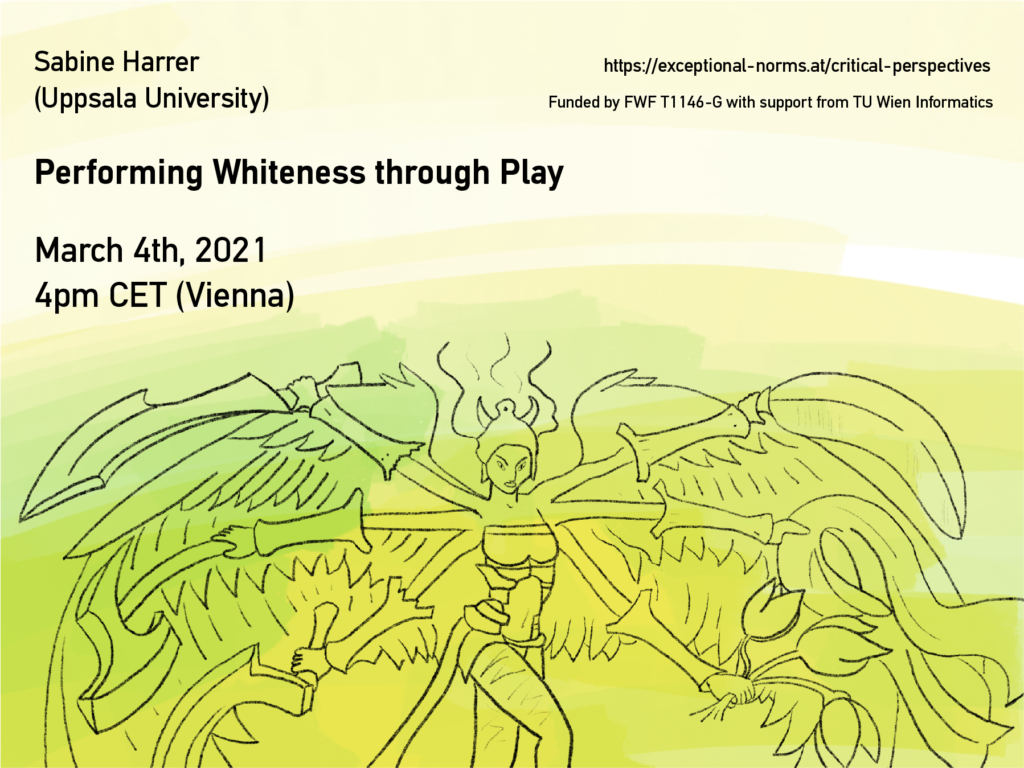
Abstract
This talk investigates how games can be understood as a contemporary media form sustaining racist, colonial legacies through their mechanical design and supported player performances. This investigation is rooted in two case studies, the classical Finnish board game Star of Africa (1951) and the US American digital deck building game Ascension: Dawn of Champions (2015). Both games exemplify in different ways how whiteness as an ideological baseline gets to pervade play through mechanical rituals coded as white supremacist. In Star of Africa, players perform in the role of white perpetration, staging a historical revisionist version of the European ’Scramble for Africa’. In Ascension, the game’s deck building rituals encourage players to invest in stereotyping and ownership of ‘diverse’ bodies through identity tourism. By reflecting on these examples as emblematic of wider trends in game design, the talk aims to highlight persistent challenges for critical playful technology design arising from white structural biases. It also looks at how these foundations of whiteness might be challenged, following critiques from Black, Indigenous, and Postcolonial game studies.
Bio
Sabine Harrer works as a faculty member at the Department of Game Design at Uppsala University, Sweden. In their artistic and teaching praxis, as well as in their writing, they use videogames as a thing to reframe, challenge, and queer norms around desire and intimacy. They have recently published the article “We Are the Champions? Performing whiteness in ASCENSION: DAWN OF CHAMPIONS” in the journal ’Simulation and Gaming’.
with Kay Kender (TU Wien) as conversation partner.